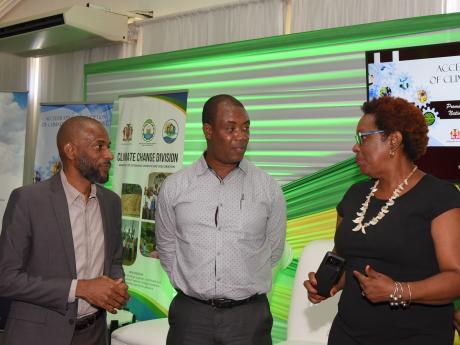RADA seeks to implement sustainable water-harvesting techniques
Chief Executive Officer of the Rural Agricultural Development Authority (RADA), Peter Thompson, says the organisation is seeking to implement sustainable water- harvesting techniques in the sector, as it seeks to boost the country’s food security.
Speaking at the recently held workshop on ‘Accelerating the Adoption of Climate Smart Agriculture in Jamaica’ Thompson said the Authority has conducted an audit of the island’s public water catchment facilities, with the objective of putting them back into service.
“We will be looking at issues related to earthen ponds. We will be looking at how we can rehabilitate some of the water catchments across the island. We have done an assessment of all the catchments we have identified and it will cost in excess of $200 million to repair them, so we will be looking at some of those,” he added.
Thompson said that while the ‘Black Tank’ programme continues to be used by farmers in their irrigation activities, more sustainable systems need to be introduced to protect the agricultural sector from shocks associated with climate change.
“One of the programmes we are pushing is the whole issue of water harvesting. Nothing is wrong with the ‘Black Tank’ programme, but we have to move away from that programme and look at more sustainable ways of harnessing water and preserving it for future use,” he suggested.
Introduced in 2009, the ‘Black Tank’ programme forms part of the Ministry’s overall drought mitigation programme for the agricultural sector.
“Most of the water we are getting from rains is destined for the ocean. When rain is falling, we don’t think of drought, but then as soon as the rain dissipates we think about water,” he said.
He said the challenges in the sector are further exacerbated by severe drought conditions and extensive bush fires across the island, which have devastated a number of farms. He estimates $400 million in losses in the sector caused by drought, bush fires and flooding.
All these factors, he pointed out, cause environmental degradation which adversely impacts the sector.
Thompson said there are 209,000 farmers registered with RADA and another 20,000 to 30,000 unregistered farmers, and that some 80 per cent of these farmers occupy marginal lands which are prone to natural disasters, such as hurricanes, which cause soil erosion.
“Many of them use bad practices, such as the use of bush fires to clear land. A result of that is the heavy siltation we are seeing in some of our dams,” he said.
“We, as agriculturalists, have to put measures in place and be proactive in addressing the issue of climate change, so all hands have to be on deck in dealing with the issue. RADA is resolute in addressing some of the concerns out in the fields,” he said.
We want to hear from you! Send us a message on WhatsApp at 1-876-499-0169, email us at editors@gleanerjm.com or onlinefeedback@gleanerjm.com.

